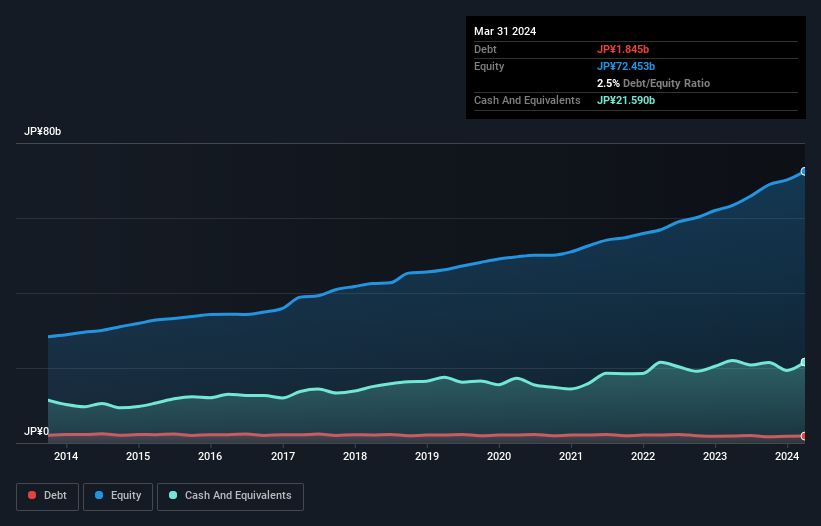
Howard Marks put it nicely when he said that, rather than worrying about share price volatility, 'The possibility of permanent loss is the risk I worry about... and every practical investor I know worries about.' When we think about how risky a company is, we always like to look at its use of debt, since debt overload can lead to ruin. Importantly, Riken Keiki Co., Ltd. (TSE:7734) does carry debt. But the real question is whether this debt is making the company risky.
When Is Debt Dangerous?
Debt and other liabilities become risky for a business when it cannot easily fulfill those obligations, either with free cash flow or by raising capital at an attractive price. In the worst case scenario, a company can go bankrupt if it cannot pay its creditors. However, a more usual (but still expensive) situation is where a company must dilute shareholders at a cheap share price simply to get debt under control. Of course, debt can be an important tool in businesses, particularly capital heavy businesses. The first thing to do when considering how much debt a business uses is to look at its cash and debt together.
See our latest analysis for Riken Keiki
What Is Riken Keiki's Net Debt?
As you can see below, Riken Keiki had JP¥1.85b of debt, at March 2024, which is about the same as the year before. You can click the chart for greater detail. However, its balance sheet shows it holds JP¥21.6b in cash, so it actually has JP¥19.7b net cash.

How Strong Is Riken Keiki's Balance Sheet?
The latest balance sheet data shows that Riken Keiki had liabilities of JP¥12.4b due within a year, and liabilities of JP¥3.72b falling due after that. Offsetting this, it had JP¥21.6b in cash and JP¥15.1b in receivables that were due within 12 months. So it can boast JP¥20.6b more liquid assets than total liabilities.
This surplus suggests that Riken Keiki has a conservative balance sheet, and could probably eliminate its debt without much difficulty. Simply put, the fact that Riken Keiki has more cash than debt is arguably a good indication that it can manage its debt safely.
While Riken Keiki doesn't seem to have gained much on the EBIT line, at least earnings remain stable for now. When analysing debt levels, the balance sheet is the obvious place to start. But it is future earnings, more than anything, that will determine Riken Keiki's ability to maintain a healthy balance sheet going forward. So if you're focused on the future you can check out this free report showing analyst profit forecasts.
But our final consideration is also important, because a company cannot pay debt with paper profits; it needs cold hard cash. While Riken Keiki has net cash on its balance sheet, it's still worth taking a look at its ability to convert earnings before interest and tax (EBIT) to free cash flow, to help us understand how quickly it is building (or eroding) that cash balance. In the last three years, Riken Keiki's free cash flow amounted to 36% of its EBIT, less than we'd expect. That weak cash conversion makes it more difficult to handle indebtedness.
Summing Up
While we empathize with investors who find debt concerning, you should keep in mind that Riken Keiki has net cash of JP¥19.7b, as well as more liquid assets than liabilities. So we don't have any problem with Riken Keiki's use of debt. Above most other metrics, we think its important to track how fast earnings per share is growing, if at all. If you've also come to that realization, you're in luck, because today you can view this interactive graph of Riken Keiki's earnings per share history for free.
When all is said and done, sometimes its easier to focus on companies that don't even need debt. Readers can access a list of growth stocks with zero net debt 100% free, right now.
New: AI Stock Screener & Alerts
Our new AI Stock Screener scans the market every day to uncover opportunities.
• Dividend Powerhouses (3%+ Yield)
• Undervalued Small Caps with Insider Buying
• High growth Tech and AI Companies
Or build your own from over 50 metrics.
Have feedback on this article? Concerned about the content? Get in touch with us directly. Alternatively, email editorial-team (at) simplywallst.com.
This article by Simply Wall St is general in nature. We provide commentary based on historical data and analyst forecasts only using an unbiased methodology and our articles are not intended to be financial advice. It does not constitute a recommendation to buy or sell any stock, and does not take account of your objectives, or your financial situation. We aim to bring you long-term focused analysis driven by fundamental data. Note that our analysis may not factor in the latest price-sensitive company announcements or qualitative material. Simply Wall St has no position in any stocks mentioned.
Have feedback on this article? Concerned about the content? Get in touch with us directly. Alternatively, email editorial-team@simplywallst.com
About TSE:7734
Riken Keiki
Engages in research, development, manufacturing, sales and after-sales maintenance of industrial gas detection and alarm equipment and analyzers in Japan and internationally.
Flawless balance sheet average dividend payer.
Similar Companies
Market Insights
Community Narratives



